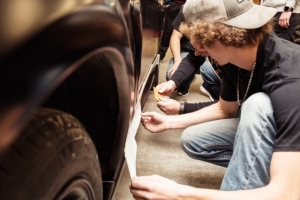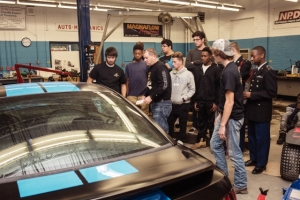Up to the challenge
By Phyllis Moore
Published in News on November 13, 2016 1:06 AM

News-Argus/SETH COMBS
Automotive students at Charles B. Aycock High School help engineering teacher Andrew Thorne apply the final decal on the 2000 Mustang that the automotive class worked on as part of the Quaker State "Best in Class Challenge" contest.

News-Argus/SETH COMBS
Automotive students at Charles B. Aycock High School look on as Steven Thorne, center, engineering instructor at the school, completes detailing to the 2000 Mustang as part of the Quaker State "Best in Class Challenge" contest.
PIKEVILLE -- Automotive students at Charles B. Aycock High School proved again this week that all the power worth harnessing isn't under the hood of a car -- it's in teamwork.
Earlier in the month the school was named one of five finalists in the Quaker State "Best in Class Challenge," an automotive education competition for high school auto shop classes.
Fifty-five schools across the country were in the running, 14 North Carolina high schools among them. When the first round of competition, online voting, wrapped up, CBA was the only one from the state in the top five.
Quaker State provided each finalist with a pre-owned vehicle worth up to $3,000 and a $2,000 budget at AutoZone to purchase needed supplies and tools.
They had six weeks to complete the next phase of the competition -- hands-on projects to overhaul the vehicle.
But for the school in the northern end of the county, the clock was ticking faster than for the other finalists.
"Because of Hurricane Matthew, he set us back a week and a half, so we had four and one-half weeks to do what everybody else did in six weeks," said Gene Stancil, automotive instructor.
Despite Wayne County Public Schools being closed for eight days, students stepped up their game, making up for the lost time and finishing the project right on time.
CBA received a silver 2000 Ford Mustang to work on.
"It came to us as a regular, driven car," Stancil said. "We had to do a complete tune-up, change all the belts and hoses, do under hood cleanup, new intake system, dual exhaust, stripped the interior out of it and cleaned everything up.
"We shampooed the carpet, put new covers on the seats, under glow lights under the dashes and a paint job."
The school's engineering class did the detailing, with Wayne Community College providing its paint lab. New lights and brakes were also part of the effort.
On Thursday, they put the finishing touches on the now-black muscle car and unveiled it for the student body during lunch.
Ellis Smith, 17, got to do "a little bit of it all," he said -- from working on the engine to helping clean the inside and assisting with the paint job.
"The project's been an experience," the senior said. "I have learned a lot of things that I didn't know. It was a fun experience to do."
Senior classmate Jeremiah Roundtree also took pride in getting to participate in the mechanical engineering, "which is the intake, the whole system, filter and the spark plugs. I also worked on the interior."
The students also had to remove and replace the window tinting, he said.
"We had to use like razor blades to take it out. It took probably four or five days," he said, praising his classmates. "It's coming together. We worked together as a team and solved it."
Canon Bennett, a freshman, wasn't in on the hands on effort but benefited from watching it unfold.
"When it first came it didn't look bad but to come together, they have definitely done a lot to it," he said. "I'm definitely going to keep applying to come to automotive (classes)."
In addition to the opportunity to bolster the vocational program, students also gained the expertise and wisdom of a "car enthusiast," a role required by Quaker State for the finalists.
For CBA, that was Evan Keel, a former automotive teacher at the school.
"I taught here for 18 and a half years but I left 35 years ago," he said. "They needed an enthusiast so somebody suggested me."
Keel had also taught Jon Horton, the program's other automotive instructor, and Steven Thorne, engineering instructor. His son, Bryant Keel, was Stancil's predecessor in the role and now works at WCC.
"Mr. (Evan) Keel was paid by Quaker State to be our inspector, making sure we don't do anything wrong, and reports back to Quaker State," Stancil said.
"I was in on the planning sessions, when they decided on colors and what kind of paint scheme they were going to have, what they were going to do to the engine," Keel said. "I would love to be out there doing it myself. It brings back a lot of memories.
"I don't do a whole lot of work on cars now. It's really been interesting to see the boys work on it, the teamwork. It's amazing to see. I think they've done a very good job."
The final round of competition takes place this week, a Facetime judging before the winner is announced.
The top five in the "Best in Class Challenge" are all guaranteed to receive some sort of prize package that includes customized tool kits and money.
But the first place grand prize also features the opportunity for the winners to travel to Florida to sell their vehicle at auction, with proceeds going to the school.
"If we don't get first place, we get to keep the car," Stancil said. "They give us the title. We can auction it off. We haven't decided yet. We can take the money and maybe do something like this again next year."
The important thing, though, the educator said, is the pride that comes from what they have already accomplished.
"We want to carry a nice car so whoever buys the car in the end gets a nice car to drive. Quaker State wants the students to understand that you can buy a $3,000 car, put a couple thousand dollars in it and have a nice vehicle, safe for the road and something nice, appealing," he said. "We put a little extra in this car, we put a lot of labor, kids did a lot of work on this car, the paint, the materials we bought.
"They have learned a lot from it. We're going to come out a winner either way."
The public can also still weigh in on the outcome, officials said. Voting online is incorporated into the final score, and can be done at http://www.quakerstate.com/en _us/people-who-use-quaker-state/best-in-class.html.
Other schools rounding out the top five finalists include Jordan Vocational High School in Columbus, Georgia; New Trier High School in Winnetka, Illinois; Kearny High School in Kearny, N.J.; and Satellite High School in Satellite Beach, Florida.
